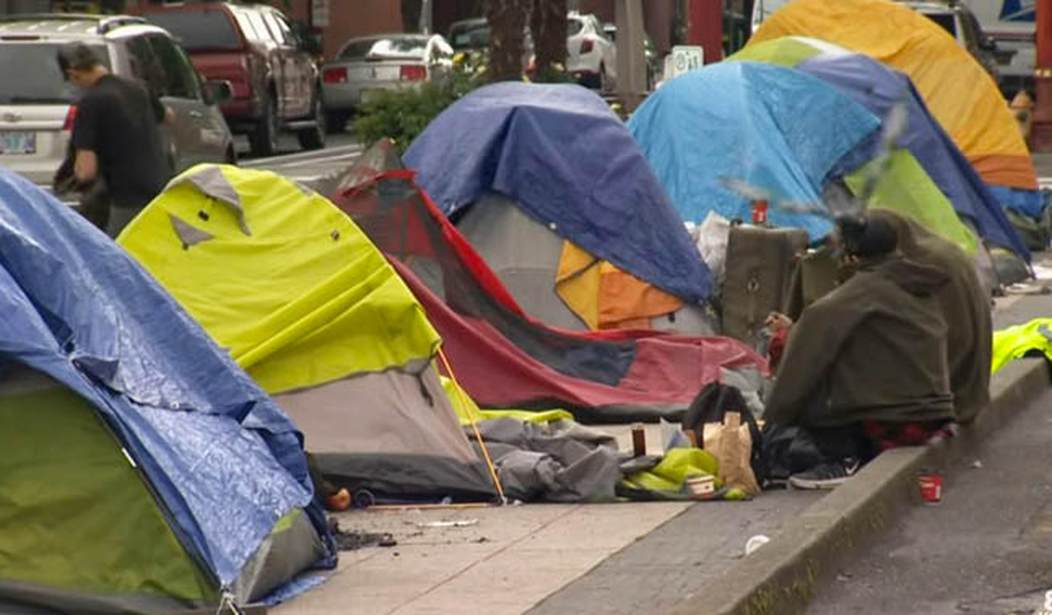America’s response to stubborn homelessness evokes the overworked, but rarely misused, definition of insanity: Doing the same thing over and over again and expecting a different result.
Along that psychological line, the federal government’s approach to reducing the nation’s population of housing-challenged is reminiscent of the Five Monkeys Experiment, the lesson of which is, “We do what we do because that’s what we’ve always done.”
On the homelessness front, what Washington has done is what Washington — since the New Deal — always has done: Shovel money. Twenty-four programs spent $7.926 billion on homelessness-related assistance in Fiscal Year 2022; the results were so successful, by 2023, the number of folks classified as unhoused surged 12 percent, to more than 653,100.
We have seen, even experienced firsthand, the evidence of our nationwide policy failure. People bundled into sleeping bags huddled in urban nooks seeking escape from the elements. Long columns of popup tents crowding strollers along sidewalks or dominating parks and playgrounds. Crime oozing up; commerce and property values sliding down.
Now along comes Florida with an idea as bold as it is overdue:
Legislators in the last week advanced bills that would require counties to ban homeless people from sleeping in public places and instead allow them to stay in designated camps with security, sanitation and access to behavioral health services.
Although [Gov. Ron DeSantis] said the legislation is still a “work in progress,” he endorsed its goal of moving homeless people off the streets. He also said he was open to assigning money to help local governments treat and house them.
“We feel that if the Legislature is willing to lean in on this, that we want to be there to be able to offer support, but it’s got to be done right,” DeSantis said during a Monday news conference in Miami Beach.
“It’s got to be done in ways that is focused primarily on ensuring public order, ensuring quality of life for residents, ensuring that people’s property values are maintained,” he added.
Although the proposal emerged from a conservative think in Texas — the Cicero Institute, founded by Austin, Texas-based venture capitalist Joe Lonsdale — Democrats and homeless advocates raced to embrace the plan, most calling it something they wished they’d thought of themselves. … Just kidding.
To Democratic lawmakers and most homeless advocates, it’s a clumsy and mean-spirited one-size-fits-all approach that will lead to more arrests of homeless people. It could also run counter to federal best practices, which encourage moving them into transitional or permanent housing.
Cicero has a few thoughts about the federal so-called “best practices,” most of them revolving around the under-appreciated “hooey.” Money plowed into free and affordable housing “creates demand for more homelessness and supports cronyism,” says its website.
The Florida experience is scarcely unique, but it is instructive. Against a backdrop of record spending to relieve homelessness, the Sunshine State witnessed a 5,000-person spike in its unsheltered in 2023.
"It is really has been tragic. We have seen so many more people falling into homelessness," said Christine Long, he chief programs director for Metropolitan Ministries in Tampa. "We weren't really prepared for the influx of need that was going to be coming our way. And it's definitely put a burden on our system of care, trying to find opportunities for folks who are really struggling right now."
Relieving that burden sooner rather than later would seem to be a praiseworthy goal. Permanent structures, while laudable, take time. Tents, not so much.
We get it. The idea of government-run encampments comes with an air of foreboding. History is a cruel teacher. Interestingly, there has been no shortage of praise for tent cities set up by municipal governments and operated by local nonprofits.
Run by Catholic Charities, Tampa Hope, a city-funded tent camp in Ybor City, Tampa’s Latin quarter, has showers, bathrooms and a kitchen. Counselors help residents find jobs, apply for government benefits, and get on a list for permanent housing.
Similar tent cities operate across Tampa Bay in Pinellas County, Orlando, and even Key West.
If adopted by legislators, the Florida Model would aspire to fracture the status quo in favor of a carrot-and-stick approach. Counties could ban camping on streets, parking lots, or other public spaces, but also would be encouraged to establish Tampa Hope-style tent cities with similar facilities for personal hygiene, policing and access to behavior health counselors.
Counties shouldn't stop at these bare minimums. Examples of other life-altering offerings can be found wherever Operation Stand Down events are held. Designed to get homeless veterans back on their feet, OSDs are one-to-three-day gatherings that include everything from medical checkups and counseling opportunities to job fairs, haircuts and even the resolution of outstanding court fines and fees.
Adding such enticements to tent cities operating under the Florida Model would make them so much more than mere safe havens. They could become springboards to the resumption of productive, successful lives. But first, you have to motivate the unsheltered into a fresh way of thinking.
That tough call begins with the Legislature having the steel to approve such a courageous, mold-breaking measure, and to once again be a leader among the 50 state laboratories in its willingness to fracture the same-old, same-old cycle of insanity.








